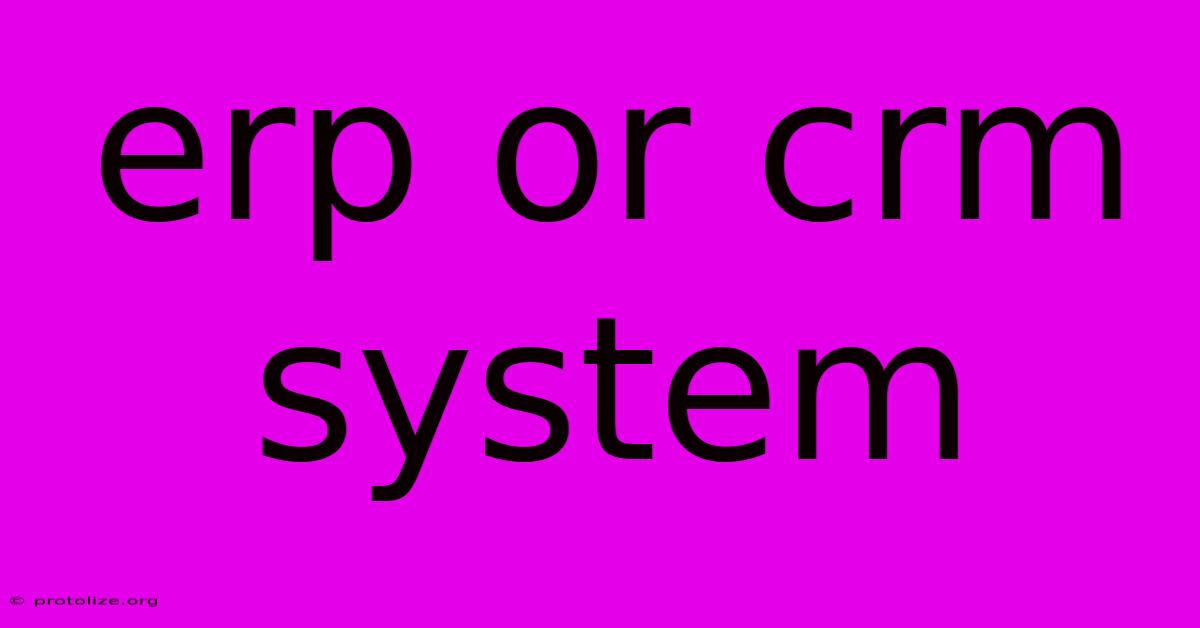Erp Or Crm System

Discover more detailed and exciting information on our website. Click the link below to start your adventure: Visit Best Website mr.cleine.com. Don't miss out!
Table of Contents
ERP vs. CRM: Which System Does Your Business Need?
Choosing the right software for your business can feel overwhelming. Two prominent players in the business management software arena are Enterprise Resource Planning (ERP) and Customer Relationship Management (CRM) systems. While they often work together, they serve distinct purposes and cater to different needs. This article will break down the key differences between ERP and CRM, helping you determine which – or if both – are right for your organization.
Understanding ERP Systems
ERP (Enterprise Resource Planning) systems are comprehensive software solutions designed to integrate and streamline all aspects of a business. Think of it as a central nervous system, connecting various departments like finance, human resources, supply chain management, and manufacturing. A robust ERP system manages everything from inventory and procurement to accounting and reporting.
Key Features of ERP Systems:
- Inventory Management: Track stock levels, manage orders, and optimize warehouse operations.
- Supply Chain Management: Streamline the flow of goods and services, from sourcing raw materials to delivery to customers.
- Financial Management: Handle accounting, budgeting, and financial reporting.
- Human Resource Management (HRM): Manage employee data, payroll, benefits, and recruitment.
- Manufacturing Management: Plan production, manage resources, and track output.
- Project Management: Organize and track projects, resources, and timelines.
Understanding CRM Systems
CRM (Customer Relationship Management) systems focus specifically on managing customer interactions and data throughout the customer lifecycle. The goal is to improve customer relationships, increase sales, and enhance customer service. CRMs provide a centralized repository for all customer information, enabling businesses to personalize interactions and improve customer satisfaction.
Key Features of CRM Systems:
- Contact Management: Store and manage customer information, including contact details, purchase history, and communication logs.
- Sales Management: Track leads, manage opportunities, and automate sales processes.
- Marketing Automation: Automate marketing campaigns, track results, and personalize customer communications.
- Customer Service Management: Manage customer inquiries, track support tickets, and improve response times.
- Sales Forecasting: Analyze sales data to predict future sales and optimize strategies.
- Reporting and Analytics: Gain insights into customer behavior and sales performance.
ERP vs. CRM: A Head-to-Head Comparison
| Feature | ERP | CRM |
|---|---|---|
| Focus | Business processes & operations | Customer relationships & interactions |
| Scope | Enterprise-wide | Primarily sales, marketing, & service |
| Key Users | All departments | Sales, marketing, customer service |
| Data Focus | Operational data | Customer data |
| Implementation | Complex, resource-intensive | Relatively simpler, faster deployment |
| Cost | Typically higher | Typically lower |
When to Choose ERP, CRM, or Both?
-
Choose ERP when: You need to integrate and streamline all aspects of your business operations, especially if you have multiple departments and complex processes. Large enterprises often benefit most from ERP systems.
-
Choose CRM when: Your primary focus is on improving customer relationships, enhancing sales, and providing excellent customer service. Even small businesses can benefit from a CRM system.
-
Choose both ERP and CRM when: You need a holistic view of your business, integrating customer interactions with overall operations. This is ideal for larger companies seeking to optimize both customer relationships and internal processes. Many modern ERP and CRM systems offer seamless integration capabilities.
Conclusion: Making the Right Choice
Selecting the appropriate system depends entirely on your specific business needs and goals. Carefully analyze your current processes, identify pain points, and define your objectives before making a decision. Consider factors such as budget, company size, and the complexity of your operations. Consulting with a software specialist can help you determine the best solution for your unique situation. Remember to consider future scalability and the potential for integration with other business tools. The right software can significantly improve efficiency and profitability – making the careful selection process well worth the effort.

Thank you for visiting our website wich cover about Erp Or Crm System. We hope the information provided has been useful to you. Feel free to contact us if you have any questions or need further assistance. See you next time and dont miss to bookmark.
Featured Posts
-
Tesla Stock Climbs Cybertruck Update
Dec 09, 2024
-
Sage Crm Cost
Dec 09, 2024
-
Week 14 Recap Falcons Vs Vikings
Dec 09, 2024
-
Alisyn Camerota Exits Cnns New Day Show
Dec 09, 2024
-
1 1 Draw Saliba Nets For Arsenal
Dec 09, 2024
